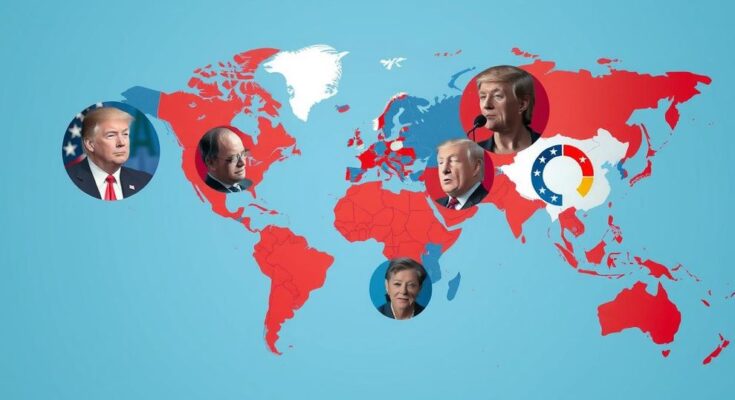The 2024 elections showcased a global anti-incumbent wave, with leaders ousted through elections and uprisings. Factors such as social media’s role in amplifying polarization and the need for governments to connect with citizens and foster economic growth for restoring public trust emerged as pivotal themes. Leaders must prioritize hopeful agendas to rebuild faith in democracy.
In 2024, the world witnessed a significant shift in political landscapes as incumbents faced tough electoral challenges and, in many cases, were removed from power. Notably, Mohammad Al Gergawi, the United Arab Emirates’ minister of cabinet affairs, emphasized that governments must seek to inspire hope in their citizens. This sentiment should guide political leaders as they transition from crisis management to creating visionary agendas for a prosperous future.
The global anti-incumbent wave has been remarkable, with notable events occurring in various countries. Senegal’s President Macky Sall suffered a major electoral defeat in March following his unsuccessful attempts to delay elections. By June, the African National Congress, which had dominated South African politics since the end of apartheid, lost its majority, resulting in a coalition government. Similarly, India’s ruling Bharatiya Janata Party also lost its majority in parliament during the same period.
The trend persisted into the latter half of the year. The Labour Party of the United Kingdom achieved a decisive victory in July, ending the Conservative Party’s long-standing rule. Furthermore, in October, Japan’s Prime Minister Ishiba Shigeru experienced a significant loss as his party lost its majority. Noteworthy as well was the ousting of French Prime Minister Michel Barnier through a no-confidence vote—the first such occurrence since 1962. Additionally, German Chancellor Olaf Scholz’s loss of a confidence vote set the stage for early elections in Germany, while Canadian Prime Minister Justin Trudeau’s political challenges deepened amid instability.
Some incumbents were ousted not through the ballot but rather through public uprisings. For instance, in August, Bangladeshi Prime Minister Sheikh Hasina fled her residence amidst widespread protests. By December, the fallout from protests in Syria forced President Bashar al-Assad to seek refuge in Russia after the collapse of his regime.
A notable factor contributing to these electoral shifts is the impact of social media. Research indicates that greater access to the internet often leads to diminished trust in governmental institutions and exacerbates political polarization. In the United States, for instance, entrenched partisanship has become increasingly pronounced, making it challenging for leaders to navigate public sentiment effectively.
Furthermore, social media fosters environments where individuals connect primarily with like-minded individuals, reinforcing their existing beliefs while amplifying emotions surrounding governance. This phenomenon can distort public perceptions and may disadvantage traditional political discourse.
Nonetheless, evidence also reveals that social media cannot singularly ensure the success of far-right populism. In several countries—namely Mexico, Spain, Greece, Ireland, Britain, Japan, and South Africa—incumbents or established parties managed to prevail, albeit weakened.
One critical observation drawn from this year’s electoral landscape is the imperative for governments to refine their use of social media. Engaging directly with constituents’ concerns is vital. For example, UK advisers visited Grimsby and solicited feedback on governmental perceptions, which reflected wide feelings of disconnection, illustrating a need for governments to reconnect with their populace.
To restore trust, leaders must prioritize economic growth and the empowerment of citizens. A comprehensive study on populism underscores how economic factors such as unemployment rates and reductions in social spending profoundly influence public opinion toward government. This is evident in the varying electoral fates of leaders in nations such as Spain and Greece, where positive economic indicators have supported incumbents, contrasting with electoral losses in economies facing decline.
Furthermore, leaders need to articulate a hopeful vision for their citizens’ future. Too often, political plans focus narrowly on immediate budgets and austerity measures. Voters, struggling with rising living costs and the financial aftermath of the pandemic, desire leaders who can inspire rather than merely manage crises.
Budget constraints should not stifle visionary thinking; indeed, historical precedents demonstrate that some of the most impactful government initiatives emerged amid adversity. Successful examples include U.S. President Franklin D. Roosevelt’s New Deal during the Great Depression and Singapore’s rapid post-independence transformation.
It is essential for political leaders to seek out visionary thinkers within society to enrich future-oriented policy discussions. Insights from innovative individuals across sectors can provide the supportive frameworks needed to create an optimistic and sustainable future.
Ultimately, developing a politics of hope will be critical in restoring public faith in democratic institutions. Residents in Grimsby expressed a desire for a political atmosphere characterized by realism, empowerment, and authenticity. Governments that rise to meet these aspirations will earn their citizens’ trust and promote a more engaged and hopeful citizenry.
The global anti-incumbent wave of 2024 reflects a significant shift in political power dynamics across numerous countries. This phenomenon has been marked by the ousting of long-standing leaders, both through electoral defeat and popular uprisings. The noted role of social media in shaping public perceptions and political engagement illustrates the contemporary challenges faced by incumbents. As governments struggle to maintain trust amidst political polarization, a call for visionary leadership emerges, emphasizing the need for hope and economic engagement.
In summary, the 2024 global anti-incumbent trend signifies a historic shift in political landscapes, driven by voter discontent and a demand for hope. Social media has played a dual role in reinforcing polarization while also revealing the need for direct engagement between leaders and constituents. To restore public trust, political leaders must prioritize economic revitalization and empower citizens with bold, visionary policies that transcend short-term thinking. Thus, a politics of hope becomes crucial for fostering democratic engagement and rebuilding faith in institutions.
Original Source: www.aspistrategist.org.au




